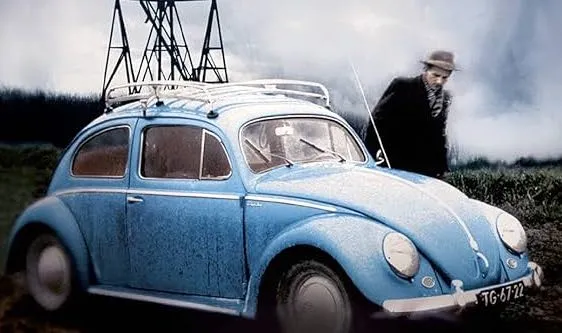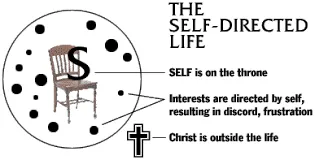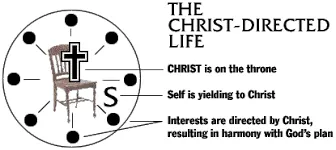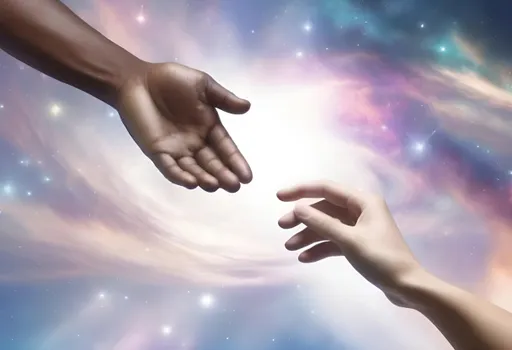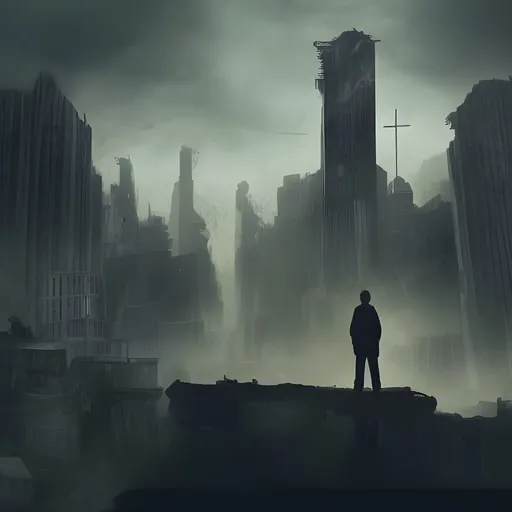5 Wacky Insights from God's Smuggler
Reflections on a story with an unconventional mission.
Last year, a friend lent me his copy of God’s Smuggler, an autobiography of Brother Andrew’s adventures behind the Iron Curtain (into Communist countries).
Over the first few chapters we're introduced to Brother Andrew, an adventurous fellow who served alongside his Dutch comrades in World War II. He is portrayed with a rebellious spirit and strong desire to make a difference to the world.
Through various encounters with God, Andrew’s faith deepened and his restlessness to share God’s message grew. As his character develops, his faith becomes a central source of courage, resilience, and a profound sense of purpose.
As I read this book, it struck me how the book offers scandalous perspectives to life—ones backed by faith and a dependence on God. To be honest, these perspectives are nothing new. We can find these ideas in the Bible directly... but it's interesting reading it from a modern POV, amirite?
1. Cease Control
And so, for the first of many times, I said the Prayer of God's Smuggler:
'Lord, in my luggage I have Scripture that I want to take to Your children across this border. When You were on earth, You made blind eyes see. Now, I pray, make seeing eyes blind. Do not let the guards see those things You do not want them to see.'
– Brother Andrew, Lanterns in the Dark, Page 117.
One aspect to living a Christ-fearing life lies in the Cost of Discipleship: to give up plans and desires for the sake of Christ. With the amount of travelling Andrew goes through, it’s only a matter of time before stringent border checks catch up with him.
In another instance, this relinquishment is spelled out more explicitly—a direct plea, but also a humble deference to Christ.
'Lord,' I went on, 'I know that no amount of cleverness on my part can get me through this border search. Dare I ask for a miracle? Let me take some of the Bibles out and leave them in the open where they will be seen. Then, Lord, I cannot possibly be depending on my own stratagems, can I? I will be depending utterly upon You.'
– Brother Andrew, The Greenhouse in the Garden, Page 185.
This character reflects how we can live a Christ-directed life through prayer, rather than living a self-directed life.
This can be very difficult to accept. After all, it requires us to deny ourselves and carry a cross (figuratively of course; Luke 14:27). We might not live a life as exciting as Brother Andrew's, but we could still serve God and experience joy in the process.
Context
The Yugoslav Government in 1957 permitted visitors to bring in only articles for their personal use. Anything new or anything in quantity was suspect because of the black market thriving all over the country. Printed material especially was liable to be confiscated at the border, no matter how small the quantity, because [coming] from out of the country, it was regarded as foreign propaganda. Now here I was with car and luggage literally bulging with tracts, Bibles, and portions of Bibles. How was I to get them past the border guard? And so, for the first of many times, I said the Prayer of God's Smuggler:
'Lord, in my luggage I have Scripture that I want to take to Your children across this border. When You were on earth, You made blind eyes see. Now, I pray, make seeing eyes blind. Do not let the guards see those things You do not want them to see.'
And so, armed with this prayer, I started the motor and drove up to the barrier...
– Brother Andrew, Lanterns in the Dark, Page 117-118.
In a separate trip to Romania…
It took me four hours to get across the Rumanian border. When I pulled up to the checkpoint on the other side of the Danube, I said to myself, 'Well, I'm in luck. Only half a dozen cars. This will go swiftly.'
When forty minutes had passed and the first car was still being inspected, I thought, 'Poor fellow, they must have something on him to take so long.'
But when that car finally left and the next inspection took half an hour too, I began to worry. Literally everything that family was carrying had to be taken out and spread on the ground. Every car in the line was put through the same routine. The fourth inspection lasted for well over an hour. The guards took the driver inside and kept him there while they removed hubcaps, took his engine apart, removed seats.
'Dear Lord,' I said, as at least there was just one car ahead of me, 'what am I going to do? Any serious inspection will show up those Rumanian Bibles right away.
'Lord,' I went on, 'I know that no amount of cleverness on my part can get me through this border search. Dare I ask for a miracle? Let me take some of the Bibles out and leave them in the open where they will be seen. Then, Lord, I cannot possibly be depending on my own stratagems, can I? I will be depending utterly upon You.'
While the last car was going through its chilling inspection, I managed to take several Bibles from their hiding places and pile them on the seat beside me.
It was my turn. I put the little VW in low gear, inched up to the officer standing at the left side of the road, handed him my papers, and started to get out. But his knee was against the door, holding it closed. He looked at my photograph in the passport, scribbled something down, shoved the papers back under my nose, and abruptly waved me on.
Surely thirty seconds had not passed. I started the engine and inched forward. Was I supposed to pull over, out of the way, where the car could be taken apart? Was I... surely I wasn't... I coasted forward, my foot poised above the brake. Nothing happened...
My heart was racing. Not with the excitement of the crossing, but with the excitement of having caught such a spectacular glimpse of God at work.
– Brother Andrew, The Greenhouse in the Garden, Page 184-185.
Relevant Verses
5Trust in the Lord with all your heart
and lean not on your own understanding;
6in all your ways acknowledge him,
and he will make your paths straight.– Proverbs 3:5-6 (NIV)
2. On Singleness
'Some people, Lord, are built for the lonely walk.'
– Brother Andrew, The Third Prayer, Page 132.
In this prayer, Andrew acknowledges some people are gifted for singleness. Despite social stigma, singleness is also a valid calling. Not everyone is called to be intertwined with another hooman.
This idea is reflected in 1 Corinthians 7:7, where the apostle Paul addresses singleness and marriage. Neither status should be looked down upon, as people are capable of serving God either way. Some people serve best when alone. Some serve better in a team, as a couple. It really depends on God's calling (1 Corinthians 7:17).
Context
At the start of this chapter, Andrew prayed for a wife, but was directed to Isaiah 54:1: "The children of the desolate are more than the children of the married.", implying his ministry to the spiritually lost should come first before marriage. Yet, he prayed another prayer:
'Lord', I said one morning, sitting on the little iron fold-down bed in my room over the toolshed, 'I've got to pray just one more time about this bachelor life You plan for me. Now I know about those children You promise the desolate, but Lord, You also promise the desolate a home!' I quickly found the verse in Psalm 68, as though to refresh His memory: "God gives the desolate a home to dwell in." 'It isn't that I don't thank You for this room about the toolshed, Lord. Just because it's dark and dank and mildewy and – doesn't mean I'm not grateful. But, dear God, it is not a home. Not really. A home is where there's a wife and children – real ones.
'Lord, Paul prayed three times for release from the torn in the flesh that was bothering him. And you refused him. I have prayed twice for a wife. I am going to pray once more. Perhaps You will refuse me a third time, too, Lord, and if You do, I shall never again bring up the question. I'm going to write it here in my Bible.' I opened the Bible to the back cover and scribbled one last notation, 'Prayed ... for ... wife ... third time ... Witte, 7th July ... 1957.' Then I closed the Bible with a snap, 'Some people, Lord, are built for the lonely walk. But not me, please. Not me.'
– Brother Andrew, "The Third Prayer", Page 132.
Although much of the passage sees Andrew asking for a wife, I thought the last bit was amusing and deserves a bit of attention.
If anything, the casual tone of the prayer goes to show how close Andrew regards God, like an understanding friend.
Relevant Verses
7I wish that all men were as I am. But each man has his own gift from God; one has this gift, another has that.
– 1 Corinthians 7:7 (NIV)
17Nevertheless, each one should retain the place in life that the Lord assigned to him and to which God has called him. This is the rule I lay down in all the churches.
– 1 Corinthians 7:17 (NIV)
3. Pray Continuously
Only one of us would be talking at a time; the other would be constantly in prayer.
– Brother Andrew, The Work Begins to Expand, Page 213.
What's that? Missionaries discovered distributed computing and load balancing?
As Andrew's team and work grew, so did their modus operandi. And as absurd as it sounds, this principle is still carried on today.
It's interesting to muse on this 'technique'. Clearly there will be situations where both members are occupied and unable to pray. So what's the dealio? The point, I think, is to (again) cease control, i.e. to acknowledge God's hand on the matter. By praying, we rely not only on ourselves but also on the one with the high ground.
Context
Andrew and his missionary partner Hans were crossing the border into Russia. As was custom, guards would inspect their papers and vehicle.
At last came time for the inspection of the car itself. Hans and I had agreed ahead of time on the technique that we used ever afterwards whenever two people were crossing a border together. Only one of us would be talking at a time; the other would be constantly in prayer: prayer that God's will be done in each detail of the inspection, prayer for the country we were entering – beginning with these employees at the border.
– Brother Andrew, The Work Begins to Expand, Page 213.
Relevant Verses
17pray continually;
– 1 Thessalonians 5:17 (NIV)
6Do not be anxious about anything, but in every situation, by prayer and petition, with thanksgiving, present your requests to God. 7And the peace of God, which transcends all understanding, will guard your hearts and your minds in Christ Jesus.
– Philippians 4:6-7 (NIV)
4. To run or to stand?
We stay because— if we go, who will be left to pray?
– Brother Andrew, The Greenhouse in the Garden, Page 194.
Ah– migration, the perennial exodus from one country to another. You would think wars and mass migration were left behind in the 20th century, but they still exist today. Wars aren't the only reason of migration; political storms and socioeconomic circumstances also lead to uncertainty, fear, and instability. No hooman worried only about their individual (or immediate family) life wants that...
The two passages quoted in this section offer unique perspectives which challenge our ideal of stability. What matters more? Comfort? Or God? ... Where are we called to?
Context
While in Romania...
I met every shade of attitude, from the extreme of defeat to the extreme of courage. It was easy to sympathise with the defeated ones. 'What can we do?' was such a natural reaction. So many had only one ambition: to get out of Rumania altogether.
Oddly though, the more devoted a Christian, the more likely he was to stay put. In Transylvania we visited such a family. These Christians had a poultry farm which was still at least partially their own property. However, the state had given them a production quota that was beyond their capacity to meet. When they failed to reach it, they had to buy enough eggs on the open market to make up the difference. Year after year this had happened, and the economic suffering was great.
'Why do you stay then? So that you can keep your farm?' I asked.
The farmer and his wife both looked shocked. 'Of course not,' he said. 'In fact, we certainly will lose the farm. We stay because—' he let his eyes travel across the valley—'because if we go, who will be left to pray?'
– Brother Andrew, The Greenhouse in the Garden, Page 193-194.
We urged our listeners to reconsider the role of a Christian when his country is in trouble. Is it to run, or is it to stand?
Life in Cuba in 1965 was not easy. But perhaps God had had His reasons for putting them in this place at this time. Perhaps they were to be His arms and legs and His healing hands in this situation, without whom He would have no representative in this land.
– Brother Andrew, Twelve Apostles of Hope, Page 261.
Context
Several months before our arrival, [Fidel Alejandro] Castro announced his plan to permit people to leave the country. Hundreds of thousands of people put their names on the list. However, only two planes flew out of Cuba each day. It would take ten years before even the 900,000 people on the original list could be flown out. Meanwhile, those who waited lost their jobs, their houses, and property. Yet 190 a day did leave, and others believed firmly that their turn would soon be coming. It was among these people who wanted to leave Cuba that we felt our trip had the greatest effect.
As we had in Eastern Europe, we urged our listeners to reconsider the role of a Christian when his country is in trouble. Is it to run, or is it to stand? Life in Cuba in 1965 was not easy. But perhaps God had had His reasons for putting them in this place at this time. Perhaps they were to be His arms and legs and His healing hands in this situation, without whom He would have no representative in this land.
One evening when I had said something like this, a stout, well-dressed man with a heavy black moustache stood up in the congregation. 'I am a Methodist minister,' he told the group. 'For the last two years I have worked as a barber. But God has spoken to me this evening. I am going to return to the ministry. I am a shepherd who has left his sheep, but I am going back to them.'
There was pandemonium. Everyone in the church had to shake his hand. I heard shouts of joy, cries of 'gracias, pastor!'
– Brother Andrew, Twelve Apostles of Hope, Page 261.
Relevant Verses
3Do nothing out of selfish ambition or vain conceit, but in humility consider others better than yourselves. 4Each of you should look not only to your own interests, but also to the interests of others.
– Philippians 2:3-4 (NIV)
5. Technology is in His Hands
Perhaps one of the most thrilling aspects of Brother Andrew is
- his relationship with technology, and
- how God uses technology (in surprising ways!).
Of all technological innovations in the 20th century, much of the book was dominated by cars. It makes sense in hindsight. Andrew does a lot of travelling. Of course, he would need a car. It's the most flexible means of travel (and probably the most cost-effective).
It started off with impromptu driving lessons by a peer, Karl de Graaf. Imagine going about your work when all of a sudden, you're told to learn how to drive.
'Hello, Andy. Do you know how to drive?'
'Drive?'
'An automobile.'
'No,' I said, bewildered. 'No, I don't.'
'Because last night in our prayers we had a word from the Lord about you. It's important for you to be able to drive.'
[...]
A week later the dike builder drove up to the door again.
'Have you been taking your driving lessons?'
'Well – not exactly...'
'Haven't you learned yet how important obedience is? I suppose I'm going to have to teach you myself. Hop in.'
That afternoon I sat behind the wheel of a motor vehicle for the first time since that disastrous morning eleven years earlier when I had driven the Bren carrier full speed down the company street. Mr de Graaf returned again and again, and so skilled a teacher was he that a few weeks later I took my driving test and pass it the first time around—a rare thing in Holland. I still could see no reason why I—who didn't even own a bicycle any more—should be carrying an automobile driver's licence around in my pocket. But Mr de Graaf refused to speculate. 'That's the excitement in obedience,' he said. 'Finding out later what God had in mind.'
– Brother Andrew, The Foundations are Laid, Page 109.
A few page flips later, Andrew found a use for his driver's licence...
'This is Andrew calling. How lucky to find you home in the middle of the day.'
'I thought you were in Berlin.'
'I am.'
'We were sorry to hear about your father.'
'Thank you. But this call is good news, Mr Whetstra. I just had to tell you. I have in my hand two pieces of paper. One is a letter from the Yugoslavian consulate in Holland turning down my request for a visa, and the other is my passport, stamped with a visa by the Yugoslav people here. I've got it, Mr Whetstra! I'm going behind the Curtain as a missionary!'
'Andrew, you'd better come home for your keys.'
'I'm sorry, Mr Whetstra, this is a bad connection. I thought you said keys.'
'I did. To your Volkswagen. We've talked it all over, and there's no untalking us. Mrs Whetstra and I decided months ago that if you got the visa, you also got our automobile. Come home and pick up the keys.'
– Brother Andrew, The Foundations are Laid Page 114
Oh joy. Free car!
Even when the car engine died, God had an exercise planned.
This was all His timing, and the question of the money was also in His hands. I was not worried, just fascinated to see how He was going to work it all out.
Context
'My crew leaves in ten minutes. They could have a new engine in for you in an hour, but you'd have to pay them a good tip for staying overtime.
'How much would the whole thing cost, including the tip?'
'Five hundred marks.'
Without hesitation I said, 'Go ahead. I'll go and get some more money changed at the train station.'
It was on board the streetcar going to the station that I counted my money and realised that all I had with me would not make five hundred marks. There'd be no help from the two students back at the garage: they were riding with me in the first place because they were flat broke.
Should I go back and cancel the work order? No. I could see God's hand too clearly in all of this. Stopping precisely at the emergency telephone, having the engine wear out here in Germany where it came from, rather than in some distant and hostile spot where replacement would have been impossible and questions awkward. I was far too familiar with the way Christ looks after the practical side of the ministry to miss these signs. This was all His timing, and the question of the money was also in His hands. I was not worried, just fascinated to see how He was going to work it all out.
When I had changed every last guilder, it came—with the German money in my pocket—to 470 marks. Fifty shy of the amount I needed to pay the bill and to buy gasoline on the way home.
'Well,' I said to myself, 'something will happen on the streetcar going back.'
But nothing did. I got to the garage to find the workmen just finishing up and my two passengers nowhere to be seen. They'd gone for a walk, one of the men said, packing away his tools. The others were cleaning up too. I could delay the moment of reckoning no longer.
And at that instant, the two young Dutchmen raced through the door, one of them waving something in his hand. 'Andy!' he shouted. 'Craziest thing ever happened to me! We were just walking along the street when this lady came up to us and asked if we were Dutchmen. When I said yes, she gave me this bill! She said God wanted us to have it!' The bill was for fifty marks.
– Brother Andrew, The Work Begins to Expand, Page 203-204.
And finally, a modern take on technology:
Although he sometimes walks the three miles to the Dutch offices of Open Doors, where all the modern technological wonders are in use, Andrew's personal workplace is not connected to the Internet and has no fax or answering machine.
'And I won't even consider installing one of those call-waiting monstrosities,' he exclaimed, 'that interrupt one phone conversation to announce another.' Technology, Andrew says, makes us far too accessible to the demands and pressures of the moment. 'Our first priority should be listening in patience and silence for the voice of God.'
– Brother Andrew, The Journey in the New Millennium, Page 277.
This last statement is true. Sometimes I wonder if I place technology (apps, games, notifications) first, before God... and I shudder at the thought. Thankfully, most phones now come with Do Not Disturb, but without self-discipline it's pointless.
Concluding Remarks
Quick recap:
- Cease control. Live a Christ-directed life.
- Singleness/A0 is nothing to be ashamed of.
- Pray continuously.
- What is your calling?
- Technology is powerful, but it's even more powerful in God's hands.
- Ultimately: Seek God's kingdom first. (Matthew 6:33)
Other interesting things:
- A congregation threw paper aeroplanes to pass prayer requests across a large hall! (Page 217) Creative! Wonder if they broke any world records for number of paper planes thrown indoors.
It was real joy reading this book. Every page sparked as much adventure and trepidation as Robinson Crusoe. Maybe I'll read Light Force next? My five insights don't do justice to the gracious work God has delivered through Andrew; but hopefully these insights may encourage us to (re)read God's Smuggler (and by extension, the Bible) and explore the adventure within.
What insights did you discover reading God's Smuggler? Do you have a favourite insight from this list? How can you apply these in your daily life?
Comments are back! Privacy-focused; without ads, bloatware 🤮, and trackers. Be one of the first to contribute to the discussion— before AI invades social media, world leaders declare war on guppies, and what little humanity left is lost to time.
